Sunday Feb 22, 2026
Sunday Feb 22, 2026
Saturday, 2 November 2019 00:10 - - {{hitsCtrl.values.hits}}
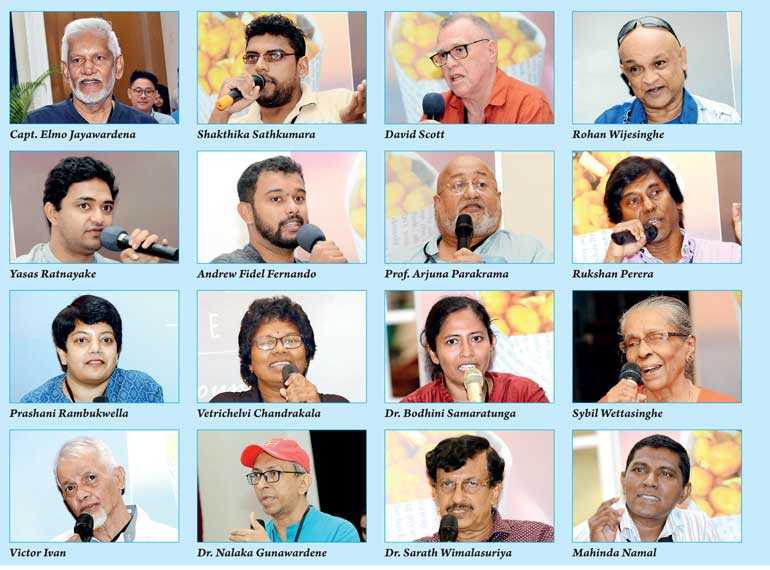
By Shailendree
Wickrama Adittiya
Literary communities in Sri Lanka are often segregated by language, resulting in a disconnect between writers, critics, and readers of Sinhala, Tamil, and English literature. Readers of Tamil novels, for instance, may have very few opportunities to engage with readers of Sinhala novels, while Sri Lankan writers of English novels may rarely find a platform that allows them to connect with readers of Sinhala or Tamil literature.
This gap is further widened by literary festivals that cater to writers and readers of a specific language, making such festivals rarely inclusive. Hoping to change this and bring literary communities of Sinhala, Tamil, and English under the same roof is the Annasi and Kadalagotu Literary Festival, also known as AK Lit Fest.
The brainchild of Capt. Elmo Jayawardena, AK Lit Fest took place on 20 October at Mount Lavinia Hotel. Held for the fifth consecutive year, the festival’s theme was ‘Have you tried the local flavour?’ The program for the day included discussions in Sinhala, Tamil, and English, and covered a range of topics from censorship to writing with disabilities to ethnic and religious reconciliation.
Should literature be censored?
Conversations on censorship, specifically in literature, were sparked by the arrest of award-winning author Shakthika Sathkumara on 1 April under the International Covenant on Civil and Political Rights (ICCPR) Act. The arrest was made over the author’s short story ‘Ardha,’ which a group of Buddhist monks claimed incited religious disharmony.
It was thus fitting that the first discussion at AK Lit Fest was on the topic of censorship, with Shakthika Sathkumara himself sharing his opinions on the censorship of literature. Moderated by Dhananath Fernando, the discussion looked at the right to expression and limitations put down by religion, in a historical context as well as in modern times.
Sathkumara, who was in custody for 130 days and was granted bail by the Kurunegala High Court in August, spoke about the need to challenge the status quo. “Censorship comes from the idea that something can be harmful to society, but how can this be applied to literature or thoughts? An action or behaviour, on the hand, can be harmful to society… The only thing that should be censored are actions,” the author said.
A question was also raised on how any publicity is good publicity and if controversial content is created solely for fame or financial gain. In response, Sathkumara explained how he lost his job of seven years and could face up to 10 years imprisonment if found guilty. In addition to this, he spoke about his experience in prison, which had a capacity of 200 people but held over 800 people following the Easter Attacks on 21 April.
“You can’t be a hero to everyone,” Sathkumara said, adding, “A person who is liked by one can be disliked by another. So I don’t believe that challenging a belief can gain you fame. In addition to this, more than fame, criticism can put your life at risk.”
He also spoke about the power the clergy has over the State, saying, “This could have ended far sooner if I had made a public apology to the Buddhist clergy but I haven’t done anything wrong to apologise.”
“Through acts like this, religious institutions hope to oppress writers. Don’t be scared. We need to face these challenges and we need to win these battles,” Sathkumara advised aspiring authors, explaining that creative freedom should be established even if it is a struggle.
Sports and literature
The discussion that followed was on a lighter note, looking at the mingling of sports and literature. Titled ‘Blood, sweat, and ink,’ the panel consisted of David Scott, Rohan Wijesinghe, Yasas Ratnayake, and Andrew Fidel Fernando, and was moderated by Rohan Wijesinha.
Author of ‘Upon a Sleepless Isle,’ Andrew Fidel Fernando spoke about his novel, as well as his observations about cricket during his travels, saying, “It’s not spreading in a meaningful way. There is very strong criticism of Sri Lankan sport and cricket in particular that it is very Colombo-centric and there isn’t a systematic effort to move out.”
“There is a huge potential for reconciliation through sport, which is not being looked at,” Fernando added.
While the conversation between the panellists focused primarily on cricket, Yasas Ratnayake shared valuable insight on Angampora, a form of martial art. Ratnayake, co-founder of ‘Angampora: A Nation’s Legacy in Pictures,’ shared details about the coffee table book and what went into collecting the material.
“There was no record of the art and the more research we did about it, the more we found out that there was a systematic erasure of information over the last couple of hundred years,” he explained.
Taking place in parallel to this discussion was ‘Tri-lingual literature: A path to peace,’ hosted by Kingsley Rathnayake, Prof. Neluka Silva, Prof. Arjuna Parakrama, and Santhan Ayathurai, and moderated by Prof. Harshana Rambukwella.
Writing with disabilities
Alongside a performance by Bambaru and ‘Little minds strong values,’ a workshop on ethics and values for kids hosted by Rukshan Perera, was a discussion, in Sinhala, on writing with disabilities. Titled ‘Anduru Lowakin Eliyata,’ the panel was hosted by Upul Senadheerage, Wasantha Pathmini, Susila Nandani, and Gamini Karunarathne.
Moderated by Virajini Tennakoon, the discussion looked at the lives of the panellists and how their interest in literature grew. Susila Nandani, a visually-impaired author, shared stories from her childhood, explaining that despite the support from her teachers, she faced many hardships due to her sight.
“And yet, I had a strength too, from birth. I can commit anything to memory after I’ve heard it only once or twice, so during my younger years, my studies were based on what I heard in the classroom. However, in higher grades, this became a challenge as there were many books we had to read as part of the syllabus,” Susila Nandani said.
“Back then, our area didn’t have electricity. I used to light a kerosene lamp so the flame was quite tall and use the light to read books in the night. I used to read so close to the lamp that the hair near my forehead would burn. My mother used to scold me for doing this, but I never listened because I loved to read,” she shared.
While the discussion between the writers gave the audience an idea about growing up with disabilities, it would have been ideal if the discussion took a closer look at what it means to be an author with disabilities in Sri Lanka and the opportunities and facilities they are in need of.
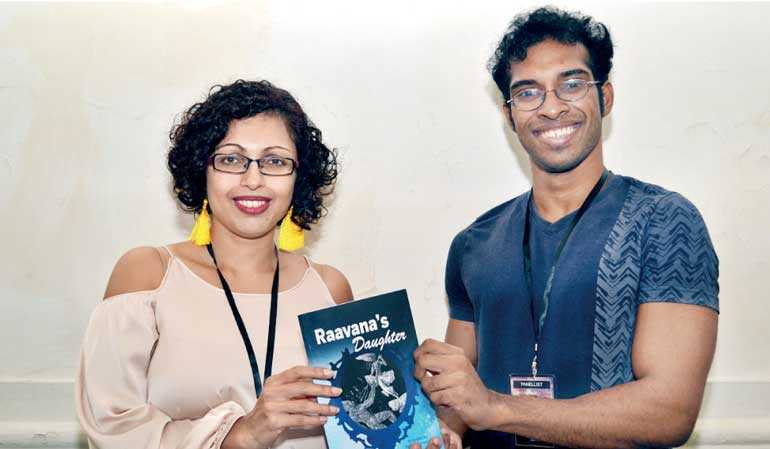
Nadishka Aloysius and Vasika Udurawane
Book launches and other events
During a time when all-male panels or ‘manels’ are heavily criticised, especially on social media, the all-women panel titled ‘A Woman’s Gaze’ was an interesting discussion between Prashani Rambukwella, Vetrichelvi (Velu) Chandrakala, and Dr. Bodhini Samaratunga, with Smriti Daniel acting as moderator.
The discussion looked at what made the panellists write, as well as if they identify as feminists and the difference between the male and female perspective when writing.
While in the segment titled ‘The child who never grows up,’ Sybil Wettasinghe in conversation with Nalaka Gunawardena shared anecdotes that had the audience laughing along, the final discussion of the day was ‘Lankawe hina,’ hosted by Samare and Samare and Janai Priyayi.
While the discussion looked at the technique and research that goes into an impersonation, it also ensured the AK Lit Fest came to an end on a lighter note, especially considering the discussions that took place throughout the day.
Other notable events that took place during the literary festival were the prize giving of the love letter competition, performances by Bambaru, and book launches, including that of Raavana’s Daughter, written by Nadishka Aloysius and illustrated by Vasika Udurawane.
Attendees were also able to browse through stalls and purchase books, including publications by the various panellists, and also meet their favourite authors. While the AK Lit Fest could have easily attracted a larger crowd, it did give attendees a good mix of local flavour, with discussions on a range of topics in Sinhala, Tamil, and English.
Pix by Shehan Gunasekara
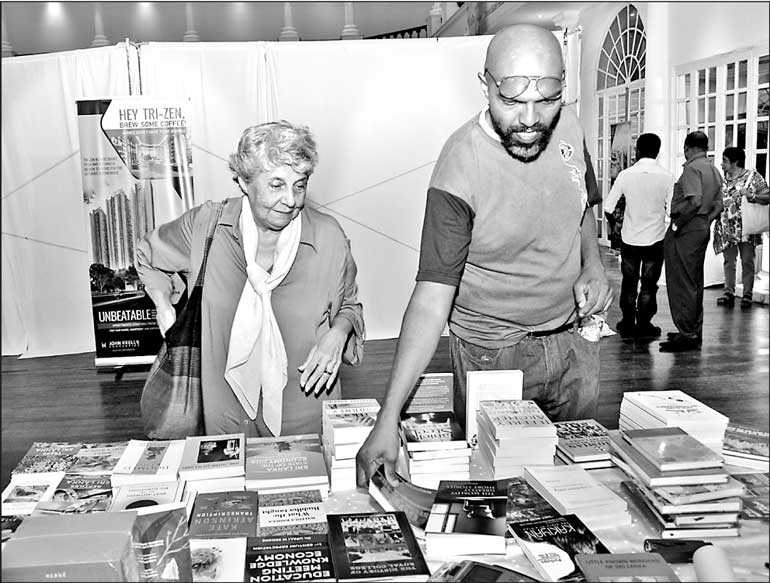
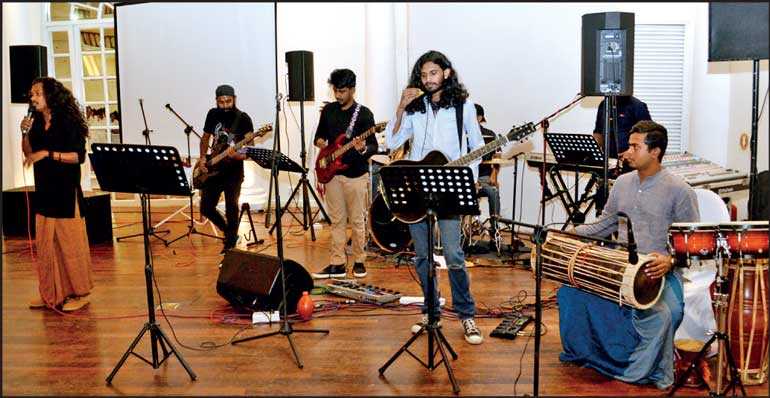
Bambaru
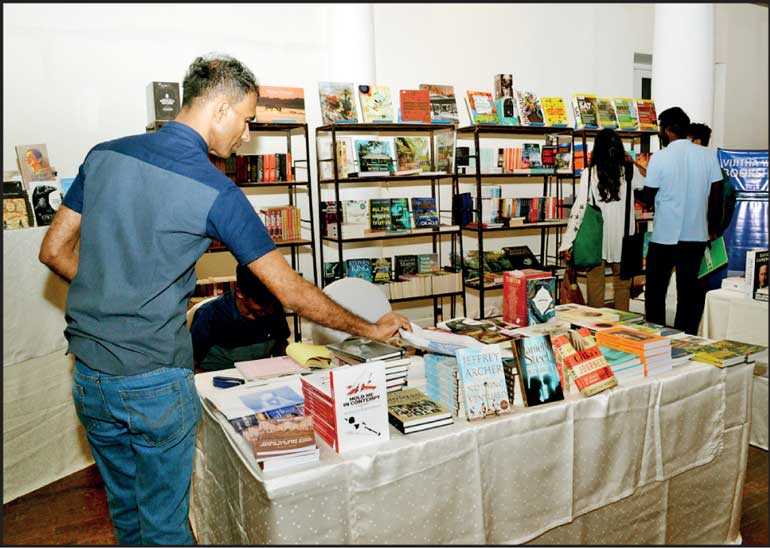
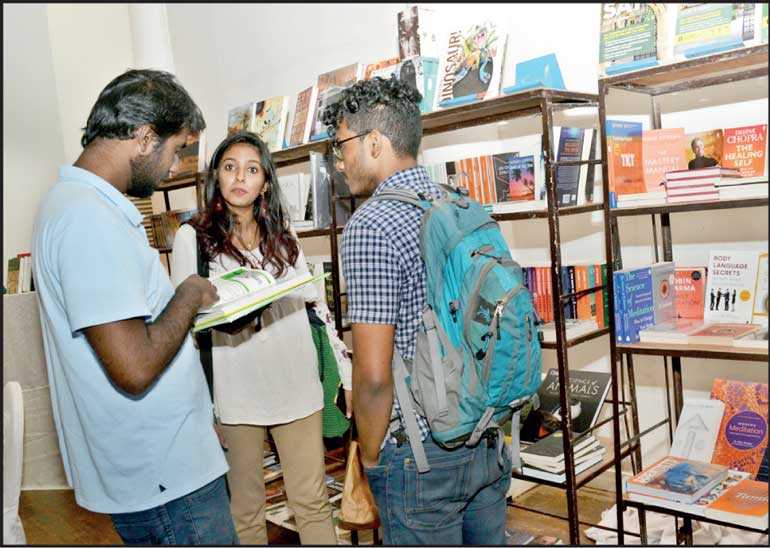
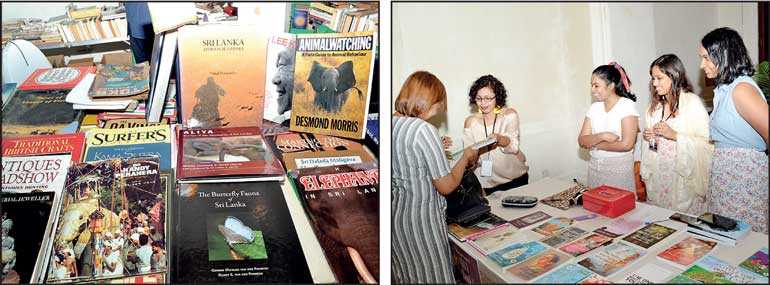
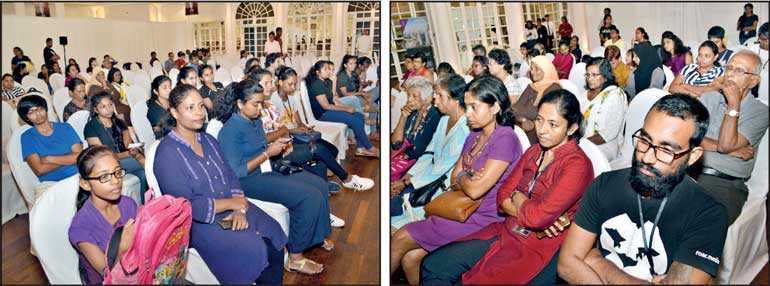
Audience